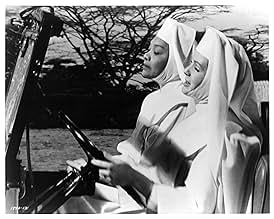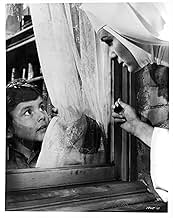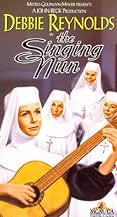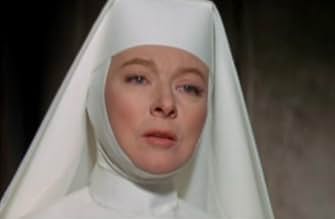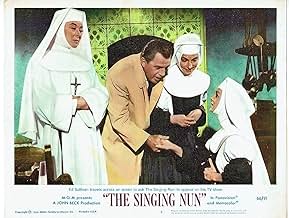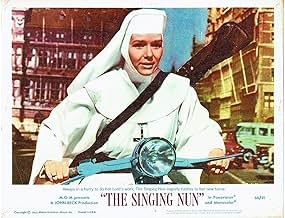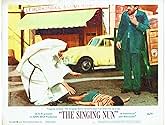Uma freira belga com talento musical extraordinário se vê dividida entre sua vocação religiosa e uma inesperada carreira no mundo da música, enfrentando desafios e tentações após alcançar fa... Ler tudoUma freira belga com talento musical extraordinário se vê dividida entre sua vocação religiosa e uma inesperada carreira no mundo da música, enfrentando desafios e tentações após alcançar fama repentina.Uma freira belga com talento musical extraordinário se vê dividida entre sua vocação religiosa e uma inesperada carreira no mundo da música, enfrentando desafios e tentações após alcançar fama repentina.
- Direção
- Roteiristas
- Artistas
- Indicado a 1 Oscar
- 1 vitória e 3 indicações no total
Avaliações em destaque
Just as the film "Jeannie Eagels" is a fantasy very loosely based on the life of ill-fated actress Jeannie Eagels and as such basically only got one or two facts straight, so does "The Singing Nun" stretch reality and we wretch. Stretch and Wretch.
On the other hand, if we accept these films as the fiction they are, then they become good "moral" stories. And so "The Singing Nut" Debbie Reynolds sings and dimples her way through a film that resembles reality in only the fact that a nun named "Sister Smile" actually put out an album of her songs and it caused a big flurry of worry for the Sister.
Maybe some of the songs in the film were actually written by Jeanne-Paul Marie Deckers but the words for "Dominique" seem to not be the same words shown in the English translation of the song on my copy of the original album. There is a song called "Sister Adele" about her Spanish guitar which is also not the same song as the one played in the film, and another funny item is the guitar Debbie Reynolds wields happens to be a Nylon Stringed Classical guitar- A Spanish Guitar does not have a round hole, a Spanish Guitar happens to have F-Holes and steel strings.
Even though this film is fiction and fantasy and ideology, I do not cringe when I see it like I do "The Sound of Music" or "My Fair Lady"- where I do not know why they bothered to write dialogue when they could have just sung those movies all the way through with no dialogue whatsoever. although the music and song in those films is overwhelming, the fact that they are nonstop though the films is also overwhelming and can only be enjoyed in very small doses. On the other hand, "The flying, er, Singing Nun" has some good acting by Anges Moorehead who is my favourite Red Headed Actress and Bey**ch, oh I just loved Agnes, she could do anything including all kinds of ethnic parts, Ricardo Montal-Khan dons a priestly habit rather than a pair of swim trunks or 23rd Century Barbarian Garb, and Katherine Ross is very good: Almost to the point that she does not resemble a girl who is heading toward prostitution, she is too squeaky-clean. Someone made a comment that all this film was missing was Bing Crosby and I agree, where was he when this was made? The main reason I like this film is because I loved the song "Dominique" as a small child - Everyone loved that song, and I mean it was everywhere when it came out. This film- Although getting the life of Soeur Sourire totally wrong, does NOT get wrong the feeling o the early 60's which I happen to remember because "I was there". I do not mean in Belgium, but in 1963, and although I grew up in southern California and not Belgium, the outdoor scenes in this film make me remember things I have forgotten for decades.
One thing the film is accurate about: That a nun could write a song, record it, and it becomes not just a local hit that was apparently originally intended to be sold only locally to help the Convent, but by a set of extremely lucky circumstances this song would also become an International hit, a worldwide hit and a song of comfort after the assassination of JFK. The film does not exaggerate the impact the song had on the world, as a matter of fact, it waters that impact down a bit.
Sister Anne had a different fate other than the one shown at the end of the film, but that does not matter to me: This film is fantasy, not reality: Because I want to think it could have been good like that for the real Singing Nun, but life is sometimes not as simple as shown in movies.
I am looking at the artwork on and in the Album Cover and there is even a set of lithographed prints... And ultimately that art speaks about a faith that is simple, and that is the only thing that matters really, and I wish that could have been brought out in this film- But it is not, it is not even mentioned at all, and he artwork was just as important as the music.
Soeur Sourire was not the person depicted in this vehicle for Debbie Reynolds ;she was a tomboy and enjoyed football games (you see her playing in the movie) ,but she loved girls -she became a nun because of that-, she was deprived of her income by her covent , she was released of her vows ,she fell prey to the gossip papers ; she was a clever woman ,who tried to resume her career and she wrote songs much superior to her famous "Dominique"but attacking the Catholic Church ; she ended her life with a woman ,coming to terms with her homosexuality ;both were ruined and committed suicide.
When she entered the covent,Soeur Sourire was a fan of American rock and roll ,and she considered music as a way to get religious messages across :why not ?Presley, Dion , Harrison , Van Morrison ,Aretha Franklin, to name but five, had their God songs too ....This side (with Ricardo Montalban as the priest who stands by her ) is only skimmed over.
If you consider the movie pure fiction ,it's pleasant to watch :nice colors ,lilting voices,delightful cast and credits in which the nun rides on the staves ,scenes a la "sound of music" , and it's a pleasure to see Greer Garson as mother superior , Agnès Moorehead and the rare Juanita Moore (the unforgettable black mom in Sirk's "imitation of life" )as nuns and Ed Sullivan as himself in a for once true event of the singing nun's short-lived career .
But all that concerns Katherine Ross and her kid brother Dominique (sic) comes from the screenwriters' imagination! So is Reynolds' and Moore's last scene.
The true story is of Jeanine Deckers, known to the world mostly at Soeur Sourire ("Sister Smile"), who called the film "a film of fiction". In the convent she was known as Sister Luc-Gabrielle and did not like the Sister Smile moniker the record company came up with. In contrast to the perfection of the movie, Jeanine Deckers was a very conflicted personality who did not like the attention of the world and definitely did not hold an attraction to a male record producer as shown in the film. In fact, she left the order in 1965, accompanied by her lover, Annie Pescher, whom she stayed with until their mutual suicide pact in 1985. Gee, if you were an old Dominique fan, I probably burst a few bubbles there.
What I think is interesting is that the true story would probably be the Hollywood choice were it made today. The 1965 film portrayed perfection and idealism. I'm sure a 2002 film would search for the seediest of details and revel in her contradictions. What is sad is that neither version would make a very good film. The excessively sweet Debbie Reynolds/Recardo Montalban version is mostly pretty dull and the true story would undoubtedly resemble yet anther VH1 Behind the Music.
Watch for Katherine Ross in her first year as an actress as about the only real character in the film. The Ed Sullivan cameo is rather interesting as well.
Você sabia?
- CuriosidadesThis movie is loosely based on the true story of Soeur Sourire, who had a #1 pop hit in America with "Dominique" in 1963. Unfortunately, the nun was a one-hit wonder whose life did not continue happily after her chart success. After leaving the church for a full-time music career, she ran into heavy financial problems and eventually took her own life in Belgium in 1985.
- Erros de gravaçãoThe song Dominique was not dedicated to the little boy Dominic, Sister Ann was friends with in the movie, but to Saint Dominic, the founder of the Dominican Order. This goof was added in the movie because the Catholic church was against Sister Ann's career, which is why the movie tells a fictionalized story.
- Citações
Father Clementi: Your songs, your music, don't you think you've won a great victory through them?
Sister Ann: What kind of victory, Father, if I've lost myself winning it?
- ConexõesFeatured in MGM/UA Home Video Laserdisc Sampler (1990)
Principais escolhas
- How long is The Singing Nun?Fornecido pela Alexa
Detalhes
- Data de lançamento
- País de origem
- Idiomas
- Também conhecido como
- The Singing Nun
- Locações de filme
- Empresa de produção
- Consulte mais créditos da empresa na IMDbPro
Bilheteria
- Faturamento bruto nos EUA e Canadá
- US$ 8.284.000
- Tempo de duração
- 1 h 37 min(97 min)
- Proporção
- 2.35 : 1


